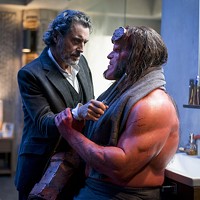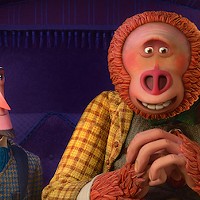

JOHN WAYNE/JOHN FORD FILM COLLECTION (1939-1957). When the American Film Institute released its list of the 100 Greatest Movie Stars several years ago, it was a shock to notice that, on the male side of the equation, John Wayne only ranked number 13. There have certainly been greater actors, but greater movie stars? Like him or not, there's no denying Wayne's gargantuan appeal with moviegoers over the decades. On Quigley's annual list of the top 10 box office stars, for example, Wayne holds the record for the most mentions with 25 (Clint Eastwood trails in second place with 21), placing on the list every year (save one) between 1949 and 1974. Wayne's popularity endured largely because he teamed with directors who understood his rugged appeal: Howard Hawks springs to mind, yet Wayne's best handler was John Ford, and together the men forged the best star-director combo in the history of American film. This collection includes eight of their collaborations, including two titles that have emerged not only as Western classics but as permanent landmarks of international cinema.
There's no underestimating the importance of Stagecoach (1939) when it comes to its standing within the Western canon. Single-handedly, the picture raised the genre from being routinely dismissed as the home of lightweight matinee fodder to the realm of artistic works capable of complex characterizations and potent psychology. It's also the film that turned Wayne into a genuine movie star: Even his first appearance in the picture is made instantly iconic thanks to cinematographer Bert Glennon's worshipful camera. Wayne plays the Ringo Kid, one of the reluctant passengers on a stagecoach that must wind its way through hostile territory. Among those also along for the ride are a tough 'n' tender prostitute (Claire Trevor, who actually receives top billing over Wayne), a notorious gambler (John Carradine) and a drunken doctor (Thomas Mitchell). Nominated for seven Academy Awards (including Best Picture and Best Director), this earned Oscars for Best Supporting Actor (Mitchell) and Best Music, Scoring.
Ford and his leading man teamed again the following year for The Long Voyage Home (1940), yet the resultant film could hardly be tagged as a John Wayne vehicle. Ford was renowned for using the same actors over and over again -- indeed, one of the pleasures of this set is noting how many times other actors frequently pop up (the great Ward Bond, for example, turns up in six of the eight titles) -- and this episodic adaptation of four Eugene O'Neill one-act plays registers as such an ensemble piece that, until the final story chunk, Wayne frequently disappears from the screen altogether. This moody drama, atmospherically shot by Gregg Toland (Citizen Kane), centers on the lives of the seamen aboard a rusty freighter, with Wayne cast as a sweet-natured Swede and Thomas Mitchell and Barry Fitzgerald among those playing more rambunctious characters. The film earned six Oscar nominations (including Best Picture), though Ford won the Best Director award for another 1940 release, The Grapes of Wrath.
As the opening credits reveal, practically all of the principal crew members involved with They Were Expendable (1945) had served in the US military (with the exception of Wayne), yet the movie isn't the simplistic piece of propaganda one might have reasonably expected. By focusing on the early days of the US involvement in World War II, when victory was anything but assured, They Were Expendable moves along curiously and cautiously, prideful of the crews of the PT boats featured in the film but also aware that each victory was achieved at a great cost and that sacrifices would have to continue to be made as the war trudged along. Top-billed Robert Montgomery (excellent) plays the levelheaded commander of the PT forces, with Wayne (as his right-hand man) adding bluster and Donna Reed (as a nurse who falls for Wayne) providing warmth.
The Western yard 3 Godfathers (1948) is part comedy and part tragedy, with a strong dose of Biblical allegory included for good measure. Wayne, Pedro Armendariz and Harry Carey Jr. play three bank robbers who stumble across a dying -- and pregnant -- woman (Mildred Natwick) in the desert. The woman kicks the bucket right after giving birth, but not before making the three desperadoes promise to take care of her baby boy. Comic antics ensue as the trio must learn how to childproof the Western frontier (think Three Men and a Baby with saddle sores instead of Tom Selleck), but suddenly the film turns grim as major characters start dropping like flies. Eventually, the story winds down in the town of New Jerusalem, the travelers' destination spot thanks to the guidance of a shining star and some choice Bible passages. 3 Godfathers is minor Ford, but it's an entertaining flick that's nevertheless hard to resist.
Fort Apache (1948) is the first picture in Ford's celebrated "Cavalry trilogy," and almost certainly the best. Wayne has rarely been more heroic (and that's saying a mouthful) than as an officer whose familiarity with the Western landscape and its Native American occupants earns him the respect of those around him. But matters become thorny with the arrival of the fort's new commanding officer (Henry Fonda), a humorless martinet whose by-the-book approach threatens to strain the already precarious relationship between white man and Indian. A 19-year-old Shirley Temple costars as Fonda's daughter (with the great name of Philadelphia Thursday); more significantly, the film laid the groundwork for examining the prickly aspects of manifest destiny, the expected racism required to settle the West, and the thin line between fact and legend -- themes Ford would further explore in movies like The Searchers, The Man Who Shot Liberty Valance and Cheyenne Autumn.
The second picture in Ford's "Cavalry trilogy," She Wore a Yellow Ribbon (1949) earned an Oscar for Winton Hoch's color cinematography, though had a Best Makeup award existed back then, surely Don Cash would have been a contender for superb work that allows 41-year-old Wayne to convincingly pass for someone a quarter-century older. The Duke plays a retiring captain who's trying to avoid going out on a note of failure; specifically, that means protecting the women (Joanne Dru and Mildred Natwick) under his watch and doing his best to quell a Native American uprising. Ford regular Victor McLaglen contributes finely aged knockabout humor as a boozing sergeant also set to retire, while Ben Johnson (another Ford favorite) makes an early impression as the most competent soldier in Wayne's outfit.
While my dissenting vote goes to Howard Hawks' Rio Bravo, The Searchers (1956) is widely cited as the greatest Western ever made. It's indeed great though not perfect: The comic relief is occasionally clumsy, and the humiliating treatment of the Native American woman Look always leaves a bad taste in my mouth. Otherwise, this is American moviemaking par excellence, with Wayne's Ethan Edwards on a double mission: to gain vengeance against the Comanches who slaughtered his family and to kill the one surviving family member, a niece (Natalie Wood) who's been "tainted" now that she's been raised for the past five years by the Comanches. Ford's breathtaking visuals (the final shot is part of cinema lore), Wayne's brilliant performance and Max Steiner's haunting score are merely three of the myriad elements responsible for this picture's lofty status.
The Wings of Eagles (1957) is the one weak title in the collection, relating the true story of Frank "Spig" Wead. Wayne delivers a boisterous performance as Spig, a renowned Navy aviator who becomes a Hollywood screenwriter (credits include Ford's They Were Expendable) after an accident leaves him paralyzed. Although the movie takes place over the course of several decades, there's no variance in either sets or costumes (every scene looks like the 1950s), and the characterizations are more shallow than we've come to expect from a Ford production. At least Ward Bond is a hoot, playing a character based on John Ford himself (named John Dodge!).
Complaints about the set? Just two. What egghead decided to include the first two installments in Ford's "Cavalry trilogy" but not the third (Rio Grande)? It should have been included instead of The Wings of Eagles. And while most of the movies in this collection look sharp, the picture quality on They Were Expendable is simply terrible, an incessant barrage of grainy, pixillating images.
Extras in the deluxe, two-disc DVD set for The Searchers include reproductions of the original press book and the 1956 Dell comic tie-in, a set of stills, audio commentary by Peter Bogdanovich, and two half-hour examinations of the film (one including interviews with Martin Scorsese, Curtis Hanson and John Milius). Extras in the two-disc Stagecoach DVD package include audio commentary by Ford biographer Scott Eyman, the American Masters episode John Ford/John Wayne: The Filmmaker & the Legend, and a new making-of documentary. Extras on the other six titles are sparse, mostly consisting of the theatrical trailer and the occasional featurette.
Stagecoach: ****
The Long Voyage Home: ***
3 Godfathers: ***
They Were Expendable: ***1/2
Fort Apache: ***1/2
She Wore a Yellow Ribbon: ***
The Searchers: ****
The Wings of Eagles: **
Stagecoach & The Searchers extras: ***
All other extras: *1/2


